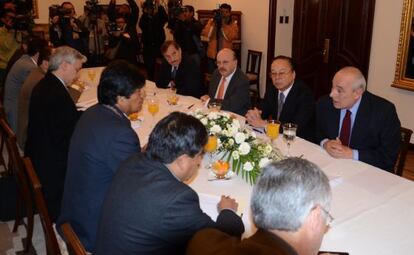Bolivia won’t drop its seaport lawsuit against Chile at The Hague
Morales wants to discuss his country’s demands for Pacific access with Santiago

Bolivia will continue with its international lawsuit against Chile demanding ocean access as part of La Paz’s strategy to strengthen the country’s participation in the Pacific Alliance trade bloc, the Bolivian government announced on Monday.
The statement was issued following a meeting between President Evo Morales and a group of former foreign ministers from his country.
“We coincide enormously in our views,” Morales was quoted as saying in the local press after meeting with six foreign ministers and Bolivia’s representative before the International Court of Justice at The Hague, Eduardo Rodríguez Veltzé.
“We are not going to withdraw our lawsuit because we want this injustice to end. We are not looking for conflicts because we are peaceful people and we are going to reiterate that the treaties won’t be touched,” Morales said.
He made his remarks in Cochabamba where he presided over a ceremony to kick off the school year.
Neither Morales nor the former ministers wanted to reveal their strategy regarding how they would be presenting Bolivia’s arguments before the ICJ in a bid to compel Chile to sit down at the negotiating table.
Bolivia lost about 120,000 square kilometers of its territory, including its only outlet to the Pacific, following the 19th-century Pacific War. Throughout the 20th century Bolivia tried on numerous occasions to obtain sea access through unsuccessful negotiations.
In 2013, La Paz filed a lawsuit against Chile at The Hague.
The former foreign ministers advised Morales that the Bolivian government should try to smooth over bilateral relations and “restore [the] mutual trust” that has been lost between La Paz and Santiago since the filing of the lawsuit, said Ambassador Armando Loaiza in a statement to the local press.
Morales said that the court’s recent ruling over maritime limits between Peru and Chile contains a paragraph which states that the two countries did not have a common border at one time because they were separated by Bolivia. Because of this statement, the president said, Chile cannot argue that Bolivia never had an outlet to the sea.
One of the options that came out of the meeting was to try to open a new round of talks soon after Michelle Bachelet takes office as Chilean president in March. During her first term in office, Bachelet, a Socialist like Morales, opened talks with Bolivia which included proposals to open a possible corridor so that La Paz would have access to the Pacific, allow free transit between citizens, and reestablish rail links between both countries.
Bolivia and Chile do not have formal relations. Since 1962, the two countries have barely engaged, except for brief moments in the 1970s. In 1978, Bolivia’s de facto President Hugo Banzer tried to jumpstart negotiations for a sea outlet with Chilean dictator Augusto Pinochet, but to no avail.
In 2006, Bachelet and Morales made some headway when they came up with a 13-point agenda for discussions between the two countries. But political tensions derailed those negotiations.
Tu suscripción se está usando en otro dispositivo
¿Quieres añadir otro usuario a tu suscripción?
Si continúas leyendo en este dispositivo, no se podrá leer en el otro.
FlechaTu suscripción se está usando en otro dispositivo y solo puedes acceder a EL PAÍS desde un dispositivo a la vez.
Si quieres compartir tu cuenta, cambia tu suscripción a la modalidad Premium, así podrás añadir otro usuario. Cada uno accederá con su propia cuenta de email, lo que os permitirá personalizar vuestra experiencia en EL PAÍS.
¿Tienes una suscripción de empresa? Accede aquí para contratar más cuentas.
En el caso de no saber quién está usando tu cuenta, te recomendamos cambiar tu contraseña aquí.
Si decides continuar compartiendo tu cuenta, este mensaje se mostrará en tu dispositivo y en el de la otra persona que está usando tu cuenta de forma indefinida, afectando a tu experiencia de lectura. Puedes consultar aquí los términos y condiciones de la suscripción digital.








































